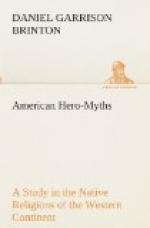[Footnote 2: “Ipse abii,” he writes in his well known Letter, “et propriis oculis inspexi, quatuor pedum et digitorum satis alte impressa vestigia, quae nonnunquam aqua excrescens cooperit.” The reader will remember the similar event in the history of Quetzalcoatl (see above, chapter iii, Sec.3)]
The story was that wherever this hero-god walked, he left behind him a well-marked path, which was permanent, and as the Muyscas of New Granada pointed out the path of Bochica, so did the Guaranays that of Zume, which the missionaries regarded “not without astonishment."[1] He lived a certain length of time with his people and then left them, going back over the ocean toward the East, according to some accounts. But according to others, he was driven away by his stiff-necked and unwilling auditors, who had become tired of his advice. They pursued him to the bank of a river, and there, thinking that the quickest riddance of him was to kill him, they discharged their arrows at him. But he caught the arrows in his hand and hurled them back, and dividing the waters of the river by his divine power he walked between them to the other bank, dry-shod, and disappeared from their view in the distance.
[Footnote 1: “E Brasilia in Guairaniam euntibus spectabilis adhuc semita viditur, quam ab Sancto Thoma ideo incolae vocant, quod per eam Apostolus iter fecisse credatur; quae semita quovis anni tempore eumdem statum conservat, modice in ea crescendibus herbis, ab adjacenti campo multum herbescenti prorsus dissimilibus, praebetque speciem viae artificiose ductae; quam Socii nostri Guairaniam excolentes persaepe non sine stupore perspexisse se testantur.” Nicolao del Techo, ubi supra, Lib. vi, cap. iv.
The connection of this myth with the course of the sun in the sky, “the path of the bright God,” as it is called in the Veda, appears obvious. So also in later legend we read of the wonderful slot or trail of the dragon Fafnir across the Glittering Heath, and many cognate instances, which mythologists now explain by the same reference.]
Like all the hero-gods, he left behind him the well-remembered promise that at some future day he should return to them, and that a race of men should come in time, to gather them into towns and rule them in peace.[1] These predictions were carefully noted by the missionaries, and regarded as the “unconscious prophecies of heathendom” of the advent of Christianity; but to me they bear too unmistakably the stamp of the light-myth I have been following up in so many localities of the New World for me to entertain a doubt about their origin and meaning.




